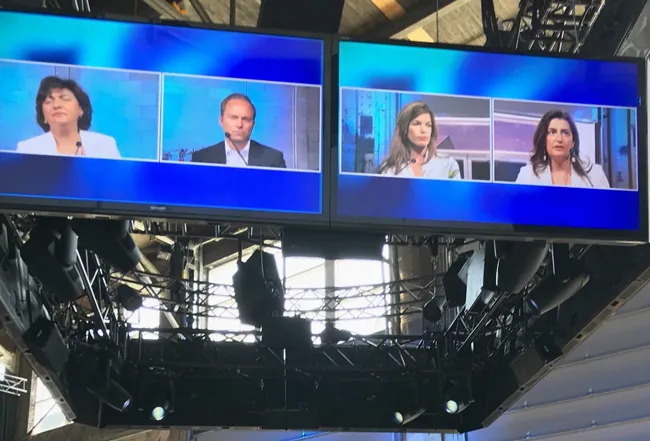
The familiar physical asset called the road will increasingly be seen as part of an emerging global services sector. Given that, the role of the road is changing, notes Christophe Nicodème, general director of the European Union Road Federation (
We need to think much more carefully about planning highway infrastructure in terms of people’s needs, said Nicodème, speaking at the first of ERF’s planned road “Lab” series. It is time for “a global approach that meets the needs of, and delivers benefits for, all the different and specific road users.”
The next generation of mobility will involve, among other things, new players from the energy and telecommunications sectors. An efficient inter–sectoral cooperation will benefit traditional stakeholders, road managers and users in terms of safety, sustainability and efficiency. There is an ecosystem developing around road planning, design and usage. It is time to think and act in new ways, he urged.
His ERF Lab looked at a series of emerging questions on the future of the world’s highways as a service provider. Debate and presentations swirled around the purpose and functionality of roads that will go beyond simply the transportation of goods and people. Roads will move from the realm of asset management to somewhere new, somewhere more associated with value-added services.
ERF president Rik Nuyttens told the Lab that future highway designers and operators will juggle ever-changing patterns of driver behaviour, the needs of constantly evolving vehicles and the desire for more adaptable infrastructure. This will be difficult to accomplish because “the average software package will last for about three years, the average vehicle for about five years but the road itself could easily have a lifespan of 30-40 years.”
Emerging trends
Also, new user trends will emerge - some even doing so now, added Xavier Tackoen of Espaces Mobilité. First, long-distance bus operators like FlixBus are growing fast across Europe. “They act like a train operator, but they use the road for free. They have a railway-style network across Europe and 40% usage rates, but they work with a very digital mindset.”
The latest online ads for FlixBus describes the service as an integrated passenger travel network where people choose from over 300,000 daily connections to over 1,700 destinations. Low-cost coach travel to France, Germany, Belgium and beyond. Free Wi-Fi. Guaranteed seat. Power sockets on board.
Book securely online. Extra legroom. And, you can travel from London to Paris for less than €15. A second key trend now emerging, said Tackoen, is highly organised carpooling schemes. Online platforms such as BlaBlaCar are matching car owners with people who want a lift in the same direction and are willing to pay for it.
“Enter your departure and arrival points and your travel date, then choose a car owner going your way,” says BlaBlaCar. Users look at possible ride-share options online and then they are told: “Book your seat online. You’ll get the car owner's phone number to arrange the final details. If you have a question, you can ask the car owner before booking.” And users are encouraged to “check out the car owners' trusted profiles, including ratings left for them by other members.”
Both of these technologies, Flixbus' method and that of BlaBlaCar, are sucking more and more passengers away from trains and planes and onto the roads.
Workplace on wheels
A third key trend is the office-bus where employers provide a commuter coach in which employees can work. They get to their desk in the bus and log in … the working day starts and ends on the bus. Office workers can leave at 4pm instead of 5pm and spend their last working hour of the day on the road, commuting home. “It is a workplace on wheels,” said Tackoen.
“As soon as you are on the bus, you are at work.” There are now nine office-bus lines in and out of Brussels and the portable desk is truly here to stay. It is a trend that could dramatically change city-centre congestion patterns, said Tackoen.
More cycle lanes, self-driving cars, satnav specialists like Waze and digitally connected travellers of all kinds mean that the road users of the future will see vehicles as nothing more than items in a connected network. “Cars will just be one of the elements in this network,” said Tackoen.
“The challenge is how to design our roads as a service provider,” enabling all this activity to take place safely and efficiently. “The road will become a commodity. You will not buy a vehicle any more. You will buy a trip. You will pay a monthly service charge to access the cars, the buses and the taxis you will need to travel over the road network.”
As the 21st century becomes “Mobility 4.0”, expect all this by 2050 in Europe, said Tackoen. He predicts a sort of Netflix platform to emerge in which the public will be able to pay for a “light” subscription option, a “medium” option or a “premium” option, depending on how much of these new road services they wish to access. For example, a premium option might include unlimited bus travel, eight taxi rides and five full days of car use per month. There will probably be a pay-as-you-go option, too.
Our roads are going to become data highways, said Tackoen. Mobility will be delivered by big data and all transport modes will be integrated. It is all going to be about “usage rather than ownership”, he said.
Under the microscope
Other papers at the ERF Lab included a look at connected infrastructure for collaborative travel management from Gino Franco of Swarco; a review of cooperative and automated mobility in Flanders from Kristof Rombaut of the Flanders Agency for Roads and Traffic; an overview of GIS and crowd-sourced data for safer roads from Ian Koeppel of ESRI; a summary of the Michelin Movin’ On Lab from Alexis Offergeld of Michelin; and a summary of the trends in infrastructure design because of vehicle automation from Maria Cristina Marolda of AET.









